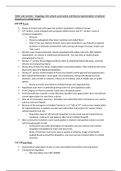Samenvatting
Summary Reading Notes Articulating Europe Block 2
- Instelling
- Universiteit Van Amsterdam (UvA)
- Boek
- Imagology
Reading notes from Articulating Europe, block 2. Includes parts of the Imagology book by Leerssen, and independent articles from De Custine, Blanton and Kapuscinski. It includes quotes, important things from the text that I picked up on while reading.
[Meer zien]





